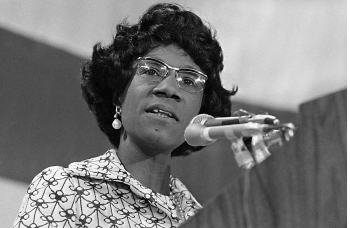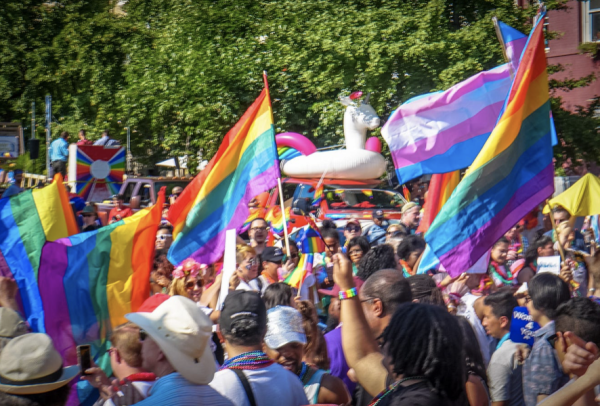Shirley Chisholm: For the Equal Rights Amendment

For her entire life, Shirley Anita St. Hill Chisholm was for education, for minorities, and for America.
Born on the thirtieth of November 1924 in Brooklyn, New York, Chisholm spent her life advocating for her strong beliefs in education opportunities for minorities and social justice.
Being the first African American woman elected to Congress in 1968 and the first African American woman to run for president in 1972, it was very clear that Chisholm was determined to change this country’s outlook on equal rights.
As she clearly had a personal connection with these issues, Shirley Chisholm delivered her “For the Equal Rights Amendment” speech to the House of Representatives on the tenth of August in 1970 with the intent of hopefully getting an amendment passed to end all discrimination.
“I am not the candidate of the women’s movement of this country, although I am a woman, and I am equally proud of that.” She said, “I am the candidate of the people of America.”
Standing in front of the pedestal unassisted, all eyes on her, all minds knowing that Chisholm was about to make a speech that could change the course of history, she began the one thousand seven-hundred and twenty-two word speech with a stern opinion.
The opinion was directed toward the notion that now is the best time to change prejudice against women.
Throughout the duration of the speech, Shirley Chisholm continued to address issues of discrimination against women, along with discrimination against minorities and the legal rights that these groups of people are deprived of.
Having served seven terms in the United States Congress, she had experience in knowing what key points would hit close to her heart when being persuaded by an aspiring advocate.
Because of this, the audience saw a unique use of pathos and logos. Chisholm appeals to the emotions of the House of Representatives by using the historical example of the Founding Fathers as evidence for why society needs to change.
As she firmly addresses the fact that the Constitution they wrote was designed to protect the rights of white, male citizens, Chisholm makes the great pity she feels apparent, due to the fact that there were no African American Founding Fathers and no founding mothers.
Believing that it is not too late to complete the work they left undone, she then begins to advocate for the fact that we the people should finish what our Founding Fathers started.
Understanding that there will always be a prejudiced group in society played a big role in her “For the Equal Rights Amendment” speech, and Shirley Chisholm used that to her advantage instead of trying to ignore that fact.
“Of course laws will not eliminate prejudice from the hearts of human beings. But that is no reason to allow prejudice to continue to be enshrined in our laws — to perpetrate injustice through inaction.”
Using this effective hyperbole, the audience becomes aware that Chisholm believes strongly that the importance of basing our actions off of what the right thing to do can change many outcomes.
As Shirley advocates for ways to rid ourselves of these discriminations, she includes the guarantee of the due process of law in the fifth and fourteenth amendments.
Stating how women are excluded from certain universities and restricted on certain juries, Chisholm then provides solutions for these controversies with the Equal Rights Amendment for which she is advocating. In explaining this amendment, she states how it would govern the relationship between the State and its citizens only, as opposed to just private citizens.
Aspiring to persuade her audience, Chisholm effectively uses repetition that causes a dramatic effect. Repeating the word “women” multiple times within making a certain point forced the male-dominant audience to become more and more attached to the situation because of the emphasis put on the word each time it was said.
Throughout the entirety of her speech, Shirley Chisholm repeats certain words to strengthen the severity of women inequalities. Having such passionate feelings towards prejudices against women, Chisholm makes an equal comparison to another one of her personal hardships – being African American.
Her goal in doing this is for the House of Representatives to see that the discrimination against women on the streets and in the work place is the same as discriminating against African Americans.
Although having only been out of the Civil Rights Movement for two years, Chisholm hoped that the professional members of the House of Representatives would have overcame any of their past racial opinions and would see the connection she was making.
Falling just three states short of having her amendment become part of The United States Constitution, Chisholm was still beyond pleased to have made that much of an impact with her speech.
Unfortunately, on the first of January in 2005, one of America’s greatest advocates had passed away in Ormond Beach, Florida.
Without a doubt, Shirley Anita St. Hill Chisholm left an unforgettable legacy for all women and men fighting for what they believe in. With a need of recognition for the change that she made in this country, Shirley Chisholm was awarded the Presidential Medal of Freedom eleven years after her death.
Robert E. Williams, president of the NAACP stated, “She was our Moses that opened the Red Sea for us.”






